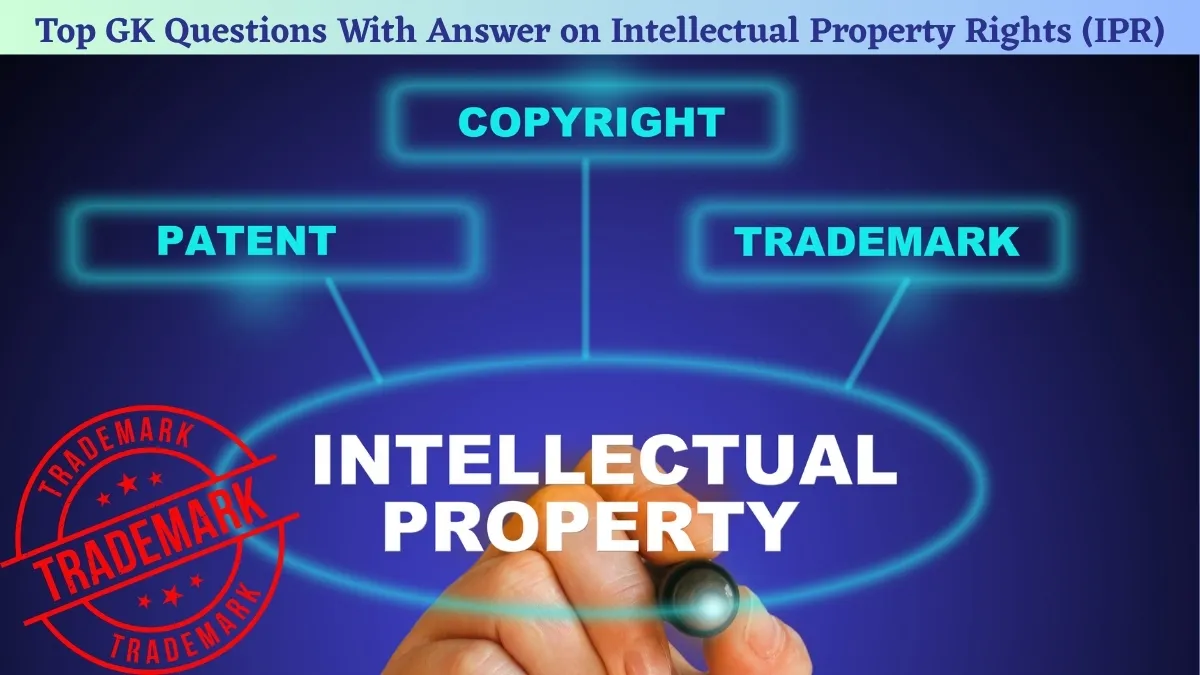Intellectual Property Rights (IPR) are a general term covering patents, copyright, trademark, industrial designs, geographical indications, layout design of integrated circuits, undisclosed information(trade secrets) and new plant varieties. These terms are used as legal rights that protect creation of the human such as inventions, literary, artistic works, design and symbols. These rights grant creators exclusive ownership and control over the use of their creations for a certain period of time. In India, IPR is governed by various legislations such as Patent Act, 1970; the Copyright Act 1957; the Trade Marks Acts, 1999, and several others . IPR plays a very important role in promoting innovations, safeguarding economic interests and increasing technological advancement by ensuring inventors are rewarded for their creativity. The administration of these rights is managed by the Controller General of Patents, Designs and Trademarks which is under the control of the Department of Industrial Policy and Promotion, Ministry of Commerce and Industry. Copyright is under the charge of the Ministry of Human Resource Development. In today's GK Question’s series, we will cover a very important topic for various exam perceptive. So. Let's explore all the important questions on Intellectual Property Rights (IPR).
Also Checkout: General Knowledge Questions on Economic Survey: Check 10+ Simple Questions With Answers
Top GK Questions With Answer on Intellectual Property Rights (IPR)
1. Which of the following legislation governs the protection of geographical indications in India?
-
The Patents Act, 1970
-
The Geographical Indications of Goods (Registration and Protection) Act, 1999
-
The Copyright Act, 1957
-
The Trademarks Act, 1999
Answer: b
Explanation: Geographical indications are governed by the Geographical Indications of Goods (Registrations and Protection) Act, 1999 which provides registration and protection for products linked to specific regions.
Also Checkout: GK Quiz on Union Budget: Challenge Your Knowledge of India’s Finances
2. Who is responsible for administering patents in India?
-
Ministry of Human Resource Development
-
Ministry of Agriculture
-
Controller General of Patents, Designs and Trademarks
-
Ministry of Telecommunication
Answer: c
Explanation: The Controller General of Patents, Designs and Trademarks, under the Ministry of Commerce and Industry, administers patents, designs, trademarks, and geographical indications in India.
3. . As per the Indian Patents Act, an invention must fulfill which of the following conditions?
-
Novelty
-
Inventive Step
-
Industrial Application
Choose the correct optionamong the following options:
-
1 and 2 only
-
2 and 3 only
-
1 and 3 only
-
1, 2, and 3
Answer: d
Explanation: An invention must be new (novel), involve an inventive step, and be capable of industrial application to qualify for patent protection under Indian law.
Also Checkout: List Of 10 Best Banks in India On The Basis Of Market Capitalisation
4. Which of the following is NOT considered a patentable invention in India?
-
New industrial process
-
A mathematical algorithm
-
Novel pharmaceutical compound
-
New agricultural tool
Answer: b
Explanation: A mathematical method or algorithm is explicitly excluded from patentability under Indian patent law, even if novel or useful.
5. What is the term of a patent under Indian law?
-
10 years from the date of issue
-
15 years from the date of publication
-
20 years from the date of filing
-
25 years from the date of examination
Answer: c
Explanations: The term of a patent in India is 20 years from the date of filing, whether provisional or complete, and is uniform across all types of inventions.
6. What is a provisional specification in a patent application?
-
A temporary legal right
-
A complete patent application
-
A document establishing early ownership
-
A document granting the patent
Answer: c
Explanation: A provisional specification helps establish priority date and early ownership but does not grant legal patent rights until followed by a complete specification.
Also Read: Poverty in India: Causes, Types and Current Status
7. Under Indian law, which of the following is not an obligation of the patentee?
-
Disclosing the invention
-
Publishing the invention before filing
-
Paying maintenance fees
-
Submitting a complete specification
Answer: b
Explanation: Publishing the invention before filing can destroy its novelty. It is discouraged, except under specific exceptions like government-notified exhibitions.
8. What does 'inventive step' mean as per the Indian Patents Act?
-
An idea copied from nature
-
A discovery without industrial use
-
A feature showing technical advancement or economic significance
-
A literary or artistic creation
Answer: c
Explanation: An inventive step must show technical advancement or economic significance, making it non-obvious to a skilled person in the art.
9. Which ministry is responsible for administering the Copyright Act, 1957 in India?
-
Ministry of Commerce and Industry
-
Ministry of Human Resource Development
-
Ministry of Telecommunication
-
Ministry of Culture
Answer: b
Also Read: What is GDP? Types, How is it calculated?
Explanation: The Ministry of Human Resource Development (MHRD) is responsible for administering copyright laws and ensuring the protection of literary and artistic works.
10. Which of the following forms is essential to request the examination of a patent application in India?
-
Form 1
-
Form 3
-
Form 9
-
Form 18
Answer: d
Explanation: Form 18 is used to file a request for examination. Without this, the patent office will not examine the application, and the process will not proceed.

Comments
All Comments (0)
Join the conversation